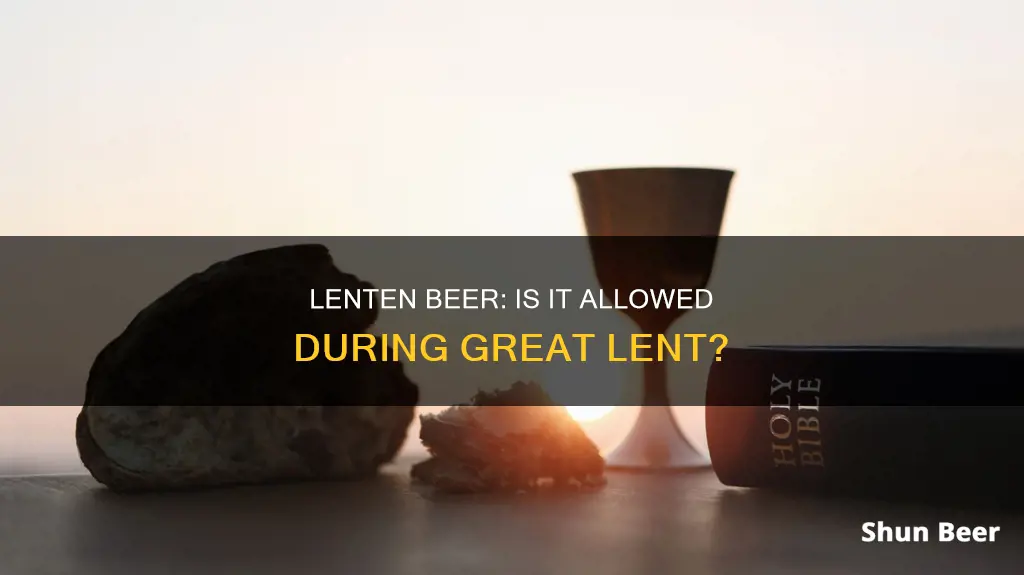
Whether or not one can drink beer during Great Lent depends on the person's religious denomination and their interpretation of the rules. For instance, while some Orthodox Christians believe that all alcohol should be refrained from during Great Lent, others argue that only wine is restricted, meaning that beer is allowed. In the Catholic Church, there is no firm stance on alcohol consumption during Lent, leaving the decision to the individual's conscience. Ultimately, the purpose of fasting is to reduce exposure and inclination to sin, so individuals should abstain from whatever they consider to be their weakness during this period.
| Characteristics | Values |
|---|---|
| Alcohol consumption during Great Lent | Orthodox Christians are encouraged to refrain from alcohol during Great Lent, except for wine on weekends and certain feast days. However, some traditions, such as the Slavic tradition, permit beer consumption during weekdays of Great Lent. |
| Beer as a substitute for water | In some historical contexts, beer was considered safer to drink than water due to its ability to kill water-borne pathogens. "Small beer", with a low alcohol content, was consumed by children and adults alike. |
| Beer as a form of fasting | Some monks have historically practised a "beer fast", consuming only beer and no solid food during Lent. |
| Beer as a source of nutrition | Doppelbock beer, for example, was invented to provide extra nutrients and vitamins during Lent. |
| Individual interpretation | Views on alcohol consumption during Great Lent vary, with some individuals choosing to abstain completely, while others interpret the rules more flexibly, particularly when it comes to beer due to its lower alcohol content. |
What You'll Learn

Beer is allowed in the Slavic tradition
In Slavic tradition, beer is allowed because it is seen as having a low alcohol content in relation to wine and liquor. It is also considered liquid bread, especially if brewed with a large amount of non-fermentable sugars, giving it a thick mouthfeel. Beer is also relatively easy to brew with a low ABV, and in Slavic areas, grain is more abundant than grapes.
In the Germanic and Western Slavic traditions, beer was the only substance used by monks, and they are the reason for many beers today, such as Double Bock (doppelbock). Beer was also considered safer to drink than water in pre-modern times, as a little wine or beer added to water could kill water-borne pathogens.
A Risky Mix: Beer and Benzonatate
You may want to see also

Beer is safer to drink than water
Drinking beer during Great Lent is a contentious issue among Orthodox Christians. Some believe that all alcohol should be refrained from during the fast, while others argue that only wine is restricted. Still, others claim that beer is allowed in the Slavic tradition due to its low alcohol content and cultural significance as "liquid bread".
Now, onto the topic of whether beer is safer to drink than water. This notion stems from the belief that, in certain historical periods, water was unsafe to drink due to pollution and bacterial contamination. For instance, during the Middle Ages, water in Europe was often polluted, leading to the perception that beer was a safer alternative. However, it's important to note that this idea is not universally accepted, and some historians argue that access to clean water was available during this time.
In the context of the Middle Ages, beer was indeed viewed as a safer alternative to water in some regions. Water sources could become contaminated with bacteria, making them unsafe for consumption. Beer, on the other hand, was believed to be less likely to cause illness due to the brewing process, which involved boiling the water and adding ingredients like hops that could inhibit bacterial growth. This belief was particularly prevalent in areas where water quality was questionable.
It's worth noting that the perception of beer as safer than water was not universal, and there are records indicating that water was commonly consumed during this period. Some people even preferred water over beer. However, the notion of beer being safer to drink than water was not unfounded, especially in areas with poor water quality or a lack of access to clean water sources.
In conclusion, while beer may have been considered safer to drink than water in certain historical contexts, it's important to approach this idea with a critical eye. The safety of beer and water can vary depending on various factors, including the region, water sources, sanitation practices, and brewing methods.
Beer Foam Stones: Do They Work?
You may want to see also

Alcohol is a way to compensate for the Great Fast
Alcohol, especially beer, has been used as a way to compensate for the Great Fast. For instance, monks invented a special beer called doppelbock to provide extra nutrients and vitamins during Lent. This practice dates back to the early Middle Ages, when drinking water could be unsafe. A little wine or beer added to water was an effective way to kill water-borne pathogens. Beer with low alcohol content, or "small beer", contained just enough alcohol to kill germs but not enough to impair one's work skills.
In the Roman Empire, beer was considered a barbarian drink. Tacitus, who first wrote about the ancient Germans or Teutons, described it as a "horrible brew fermented from barley or wheat". Eusebius of Caesaria, Jerome, Theodoret, and Cyril of Alexandria also looked down on beer, referring to it as the "cloudy manufactured water of the Egyptians". In contrast, wine was the alcoholic drink of choice in the Roman Empire and was associated with merry-making. As such, drinking wine during a fasting period would be inappropriate.
In the Slavic tradition, beer is allowed during Great Lent. This is partly because, historically, grain was more abundant than grapes in Slavic areas, making beer the drink of choice. Additionally, beer was considered "liquid bread", and drinking it was not seen as indulging in alcohol.
In summary, alcohol, particularly beer, has played a role in helping people get through the Great Fast, whether for nutritional or sanitary reasons. However, it is important to note that excessive drinking is not condoned, and the decision to include alcohol during Lent should be made in alignment with one's personal beliefs and spiritual goals.
Enjoying Beer at the Beach: Is It Allowed?
You may want to see also

Beer is considered food in Germany
In Bavaria, Germany, beer is considered a food and not a beverage. It is referred to as "liquid bread". The Bavarians have an annual average consumption of nearly 250 quarts of beer per person, almost double that of the rest of West Germany. Beer is so important in Bavaria that its price is like a cost-of-living index, and increases have triggered rebellions and even led to the abdication of King Ludwig I in 1843.
The consensus is that Munich beer is the best in Germany, and the world. This is largely due to Bavaria's Duke Wilhelm IV, who in 1516 decreed that beer could only be brewed from malt, hops and water, with no additives or preservatives. This is proudly hailed by Bavarians as the world's first pure food law, and it is still so rigidly enforced that beers brewed differently or adulterated with chemicals are not allowed to enter the state.
Bavaria plays a very special role in German beer production: almost half of all German breweries are located there. The small community of Aufseß in Upper Franconia has the highest density of breweries per inhabitant in the world, with four different breweries serving just 1,287 inhabitants (as of 2018).
Beer is also an essential part of a traditional Bavarian "Weißwurst" breakfast, which includes sweet mustard, a pretzel, and wheat beer. According to Bavarian folklore, this hearty breakfast must be consumed before 12 noon.
In addition to being consumed on its own, beer is also used in Bavarian cooking. A delicious beer speciality from Upper Franconia is "Herb noodles with Bamberg beer onions", or the classic delicacy from Nuremberg, "Gingerbread and cherry dessert with dark beer foam".
DayQuil and Beer: A Safe Mix?
You may want to see also

Alcohol is a social crutch
Drinking alcohol during social events is a common practice, and while it may be enjoyable, it can become a crutch. Alcohol is often used as a social lubricant to ease anxiety and awkwardness, but this can turn into a reliance, impacting your relationships and overall well-being. This is especially true for introverts or those with social anxiety, who may find alcohol provides a temporary solution to their discomfort. However, it is essential to address the underlying issues and practice self-care rather than turning to alcohol as a crutch.
Signs That Alcohol Has Become a Social Crutch
- Craving alcohol: If you find yourself yearning for alcohol in social settings, it may indicate a problematic relationship with alcohol. It suggests that you feel you cannot enjoy social situations without it.
- Impact on relationships: If your drinking has led to concerns from loved ones or is causing you to prioritise drinking over repairing relationships, it may be a sign of alcohol misuse.
- Negative consequences: Alcohol consumption should not interfere with your daily life and well-being. If you are experiencing negative consequences, such as a hangover that affects your next day, it may be a sign of over-reliance on alcohol.
- Needing alcohol to socialise: While alcohol can make socialising easier for introverts, it is important to address the underlying need for self-care and quality alone time. Relying on alcohol to function in social settings can lead to alcohol abuse.
- Unpredictable drinking: Losing control over the amount you drink or drinking more than intended can be a sign of a serious problem with alcohol.
- Pre-drinking alone: Drinking alone before social events to "take the edge off" and then continuing to drink with others is a dangerous pattern that may increase the risk of drunk driving or using alcohol to cope with emotions.
Alcohol and Social Anxiety
For individuals with social anxiety, alcohol can seem like a solution to their discomfort in social situations. However, this can quickly turn into a crutch, and the temporary relief provided by alcohol does not address the underlying anxiety. It is important to recognise that while alcohol may provide short-term relief, it is not a sustainable solution and can lead to unhealthy habits and increased anxiety in the long run.
Alcohol in the Context of Great Lent
The question of abstaining from alcohol during the Great Lent in Orthodox Christianity has varying answers. While some interpret the rules to mean abstaining from all alcohol, others allow for wine on Saturdays and Sundays and certain feast days. Beer is also permitted in some traditions, particularly in Slavic cultures, due to its low alcohol content and historical context as "liquid bread". Ultimately, the decision to drink or abstain during Great Lent may depend on individual interpretation and guidance from spiritual leaders.
The Magic of Beer Widgets: How Do They Work?
You may want to see also
Frequently asked questions
It depends on your personal beliefs and the tradition you follow. Some people choose to give up alcohol for Lent, while others only refrain from drinking on specific days of the week. Ultimately, it is a personal decision and there is no definitive answer.
There are several reasons why someone might decide to give up alcohol for Great Lent. It could be a way to save money, reduce empty calories, or avoid using drinking as a social crutch. Some people also see it as a challenge and want to see what happens when they give up alcohol for a period of time.
Yes, cultural and regional differences can play a role in the decision to drink beer during Great Lent. For example, in some Slavic traditions, beer is permitted during the fast, while in other regions, such as Ireland, drinking during Lent may be less common.







